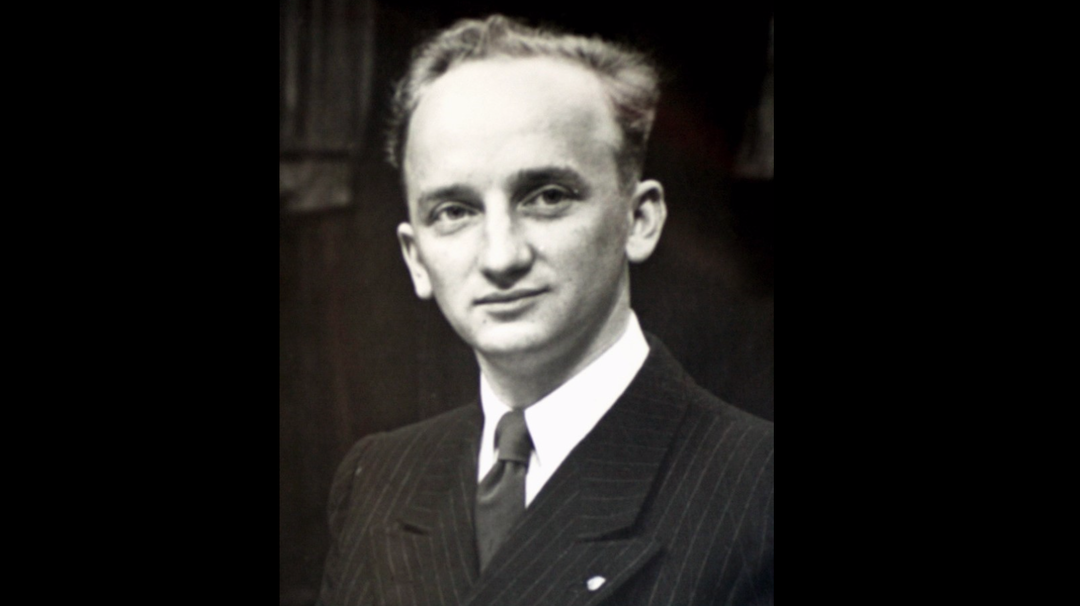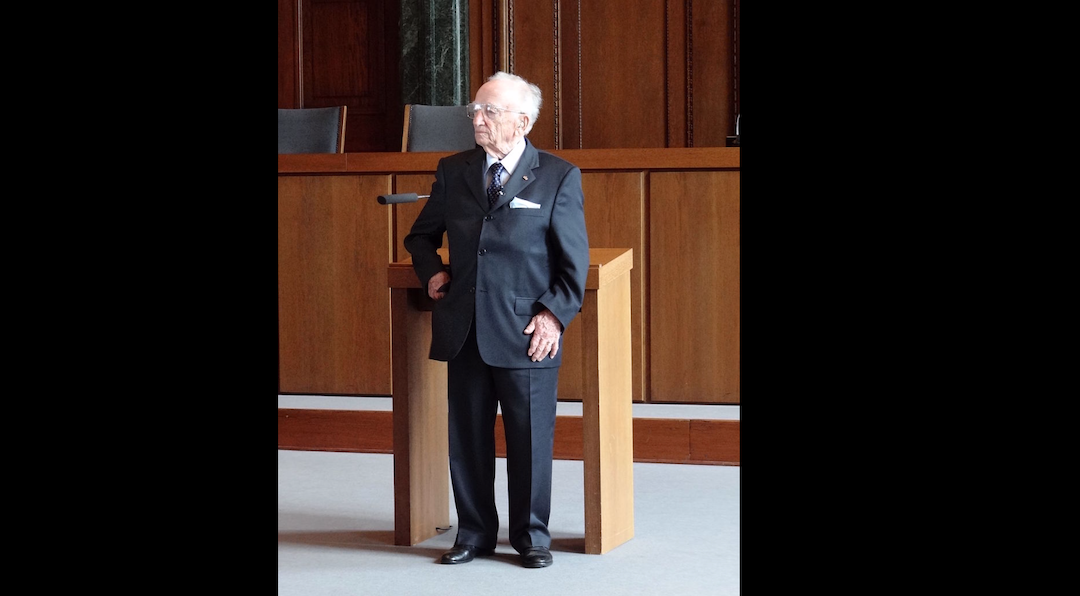Benjamin Ferencz, the last surviving prosecutor of Nazis at Nuremberg, dies at 103
Ferencz was 27 and a graduate of Harvard Law School when he was named as the chief prosecutor at the Einsatzgruppen Trial, in which 20 members of the SS’s mobile death squads were convicted of war crimes and crimes against humanity

Prosecutor Benjamin Ferencz at the Einsatzgruppen Trial in Nuremberg, which lasted from September 1947 until April 1948. (Wikipedia)
(JTA) — Benjamin Ferencz, the last surviving member of the prosecuting team at the Nuremberg trials that convicted Nazi ringleaders for crimes against humanity, died Friday evening in Florida. He was 103.
Ferencz was 27 and a graduate of Harvard Law School when he was named as the chief prosecutor at the Einsatzgruppen Trial, in which 20 members of the SS’s mobile death squads were convicted of war crimes and crimes against humanity. Two others were convicted of membership in a criminal organization.
Slight and boyish looking, he is seen in newsreel footage of the trials speaking deliberately and passionately in an accent shaped by his upbringing in Manhattan. “Vengeance is not our goal, nor do we seek merely a just retribution,” he tells the tribunal. “We ask this court to affirm by international penal action, man’s right to live in peace and dignity, regardless of his race or creed. The case we present is a plea of humanity to law.”
Ferencz would go on to play a key role on the team that negotiated the watershed 1952 reparations agreements under which West Germany agreed to pay $822 million to the State of Israel and to groups representing Holocaust survivors. Ferencz was featured in two recent documentaries about the Holocaust and its aftermath: Ken Burns’ PBS series, “The U.S. and the Holocaust,” and “Reckonings: The First Reparations,” a 2022 film funded by the German government with support by the Conference on Jewish Material Claims Against Germany.
In a statement about the latter film and his role in the reparations negotiations, Ferencz said: “At the time, we were just trying to do what was right. Looking back, I can see that it was this work, the legal work of negotiating agreements and finding justice, that led to peace. It is the indemnification that allowed both Israel and Germany to find a peaceful path forward and rebuild themselves on the world stage.”
In December 2022, the U.S. Congress awarded him the Congressional Gold Medal, its highest honor, thanks to lobbying by six House members led by Rep. Lois Frankel (D-Florida).
“Ben Ferencz was a giant,” said Menachem Rosensaft, the general counsel and associate executive vice president of the World Jewish Congress, in a statement. “He devoted himself to the very end of his long and distinguished career to making sure that the lessons of Nuremberg would become engrained in both international law and the consciousness of society as a whole. He was also a fierce and tireless champion of providing at least a modicum of justice to Holocaust survivors.”
Born in Transylvania in 1920, Ferencz immigrated to the United States with his Jewish family as an infant. They settled in Manhattan, where he attended City College of New York and law school at Harvard. He joined the U.S. Army after graduation, where he was eventually assigned to the headquarters of Gen. George S. Patton’s Third Army and a team tasked with collecting evidence for war crimes. At Buchenwald, he once recalled, “I saw crematoria still going. The bodies starved, lying dying, on the ground. I’ve seen the horrors of war more than can be adequately described.”
Ferencz was a civilian by the time he led the team at the Einsatzgruppen Trial, one of the “Subsequent” Nuremberg proceedings that followed the 1945-1946 International Military Tribunal. The Subsequent trials, held between 1946 and 1949, were held by U.S. military courts and dealt with cases of crimes against humanity, the use of slave labor and atrocities against prisoners of war and partisans. Of all the cases brought against Nazis, the Einsatzgruppen Trial, which lasted from September 1947 until April 1948, was the only one to have Holocaust crimes as its major focus.

After the trials Ferencz became director-general of the Jewish Restitution Successor Organization and fought for compensation for victims and survivors of the Holocaust and the return of stolen assets. He entered private law practice, and later worked for the institution of the International Criminal Court, which was established in 2002. He was fiercely critical of the decision by the United States not to ratify the treaty that established the court. “War-making itself is the supreme international crime against humanity and … it should be deterred by punishment universally, wherever and whenever offenders are apprehended,” he wrote in 2018.
From 1985 to 1996, he was an adjunct professor of international law at Pace University in Manhattan. He eventually retired to South Florida, but remained vocal in his opposition to war.
Ferencz is survived by a son and three daughters. His wife Gertude died in 2019.
In 2017, the Municipality of The Hague honored Ferencz for his achievements by naming the footpath adjacent to the Peace Palace after him. That same year, the U.S. Holocaust Memorial Museum’s Simon-Skjodt Center for the Prevention of Genocide launched the Ferencz International Justice Initiative.
This article originally appeared on JTA.org.














